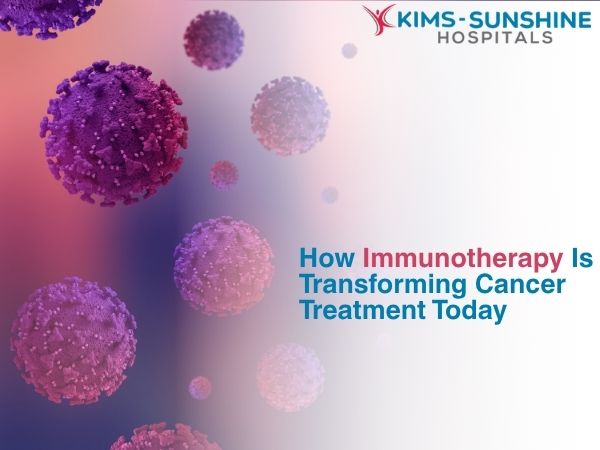
How Immunotherapy Is Transforming Cancer Treatment Today

Cancer is normally defined as uncontrolled division of cells which have mutated from the normal cellular path- and for cells to be able to divide so indiscriminately, a bunch of other helpful mutations come into play- like those which help the cells keep dividing, ignore cell division cessation cues, move around in the body stealthily and hide from the immune cells in particular. This is why cancer is treated with a bunch of different approaches like chemotherapy, radiation therapy, immunotherapy etc. Immunotherapy is a method that emphasises on improving the immune system- by using specifically engineered drugs or antibodies or cells which help immune cells identify cancer cells better- so that they can eventually be destroyed.
How Does Immunotherapy Work In Cancer Treatment?
So, in essence, immunotherapy just tells your body to get smarter about identifying and killing cancer cells, while sparing the healthy ones. This can be done by injecting specially engineered immune cells into your body, or by injecting immune cell proteins- or antibodies, which are made to tag and destroy specific antigen or protein containing cancer cells. The immune system can get duped due to causes like- the cancer cells showing the same markers as normal cells, masking their cancer causing ability and hiding in deep tissue crevices where immune cells find it harder to move around or even giving off signals that they are not cancerous, but normal. Immunotherapy does not work well for all cancers though, so it needs to be used with other treatments. But, cancers of the bladder, cervix, oesophagus, head and neck, liver, triple negative breast cancer, melanomas, small cell lung cancers and mesotheliomas respond particularly well to immunotherapy.
Types Of Immunotherapy Used In Cancer
The different possible types of immunotherapy regimens can include the following-
- Checkpoint inhibitors which help the immune system by removing ‘checkpoints’ and giving immune cells the green signal to go ahead and destroy any dangerous cells or substances that it identifies in the body.
- CAR-T Cell therapy- Chimeric Antigen Receptor Cell Therapy- the immune T cells from a cancer patient are taken out of the body and then engineered to express cancer specific proteins- which means they can then bind to cancer cells selectively and destroy them.
- Immunomodulators work to help boost immune system function. They work by cutting off blood supply or stopping formation of new blood vessels to feed tumours.
- Monoclonal antibodies are antibodies of a single origin- which can be injected into the body. They then act along with your immune cells and help get rid of cancer cells in the system.
- They are super specific and kill only cancer cells with specific markers.
- Viruses which are oncolytic in nature- engineered viruses are injected into the system. These viruses then go on to infect only cancer cells, leading to their eventual destruction.
- Cytokine therapy- when cytokines or cellular messenger molecules are injected into the body- these stimulate immune cells to work better.
- Cancer vaccines work like normal vaccines- they tag cancer cells and then tell immune cells which ones to attack and which ones to leave.
Benefits Of Immunotherapy For Cancer Patients
The main advantage of immunotherapy is that cancer cells get killed selectively, while sparing healthy tissue. Immunotherapy can be used along with other treatment approaches, for a more well-rounded fight against cancer.
Side Effects Of Immunotherapy Cancer Treatment
The other side of permanently asking the immune system to work on hyperactive mode is the chance of having to deal with excessive chronic inflammation in the body, due to the massive release of cytokines. So, some side effects that you will deal with are extreme fatigue, fevers, rashes, diarrhoea, vomiting, nausea and reduced thyroid hormone levels respectively.
Conclusion
Immunotherapy is used to treat certain kinds of metastatic cancers that have spread to different parts of the body. The type of immunotherapy regimen you undergo depends on which cancer you have, how severe it is or which stage it is in and how your immunity is, in general. Immunotherapy does not work for everyone, so doctors need to be careful about who to recommend it for. Side effects are mostly manageable, but if you think your symptoms are pretty bad, it is time to talk to your doctor and look for other therapeutic options.






